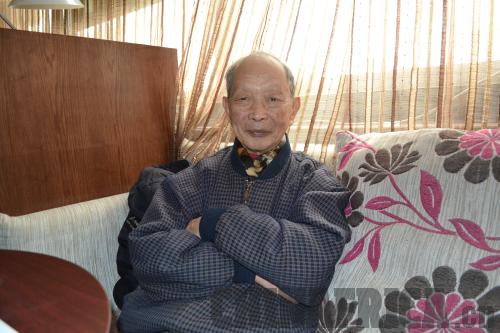|
 |
|
Wang Qinmei (PHOTO BY LIU JIAN) |
Wang Qinmei, 82, has been involved in African affairs since the 1950s, and for nearly 20 years he worked at Chinese embassies in the Republic of the Congo, Benin and Mauritania. He also led a medical team in the Republic of the Congo for three years in the 1960s. In 1997, he used part of his life savings and monthly pension to set up China's first African Studies Scholarship, which has benefited many Chinese students. Now retired and battling cancer, Wang recently spoke to ChinAfrica about his life's work.
Why did you set up the African Studies Scholarship?
I was able to concentrate on my studies in the 1950s thanks to the Chinese Government's financial support. Why not give back something? To keep China-Africa relations growing, we must cultivate educated successors. China still has a lot of people below the poverty line, whose children cannot afford school tuition. I've established the scholarship at three universities [to change this]: Peking University, which founded China's first Institute of Afro-Asian Studies; Xiangtan University, whose Center for African Laws and Society is China's first research institution for African law; [and] Zhejiang Normal University, whose Institute of African Studies is the first for comprehensive African studies in Chinese universities.
In the eyes of many, Africa represents poverty. How do you see Africa?
Africa is both poor and not poor. Poverty there is a reality: of the 40 poorest countries in the world, Africa is home to most. But Africa's spirit is not poor at all. [During colonialism], when they had no guns, they resisted with poisoned arrows. In the 1960s, African countries gained their independence one after another. But political independence doesn't mean over all independence – there is no economic independence yet. [But the economy] has been growing. Despite the financial crisis, growth was 5 percent in 2011. I think the second half of the 21st century will see Africa's economic renaissance.
In 1967 when you served as a medical team leader in the Republic of the Congo, you saved the life of a local woman. What happened?
Our team was stationed in the town of Fort-Rousset (it reverted back to its African name, Owando, in 1977). One day, a woman was carried to our team. She was suffering massive bleeding after an injury, and her hemoglobin was a fourth or fifth of what it should be. She could have died at any moment. What made things worse was that there was no blood bank [and] blood donation was not practiced. I rolled up my sleeves and donated 400 ml blood. She survived after the transfusion.
The president of the Republic of the Congo awarded me a medal of honor. I was happy because I contributed to the China-Africa relationship with my blood.
Conditions were difficult in Africa in the 1960s. What was most difficult for you?
In our minds, nothing was that difficult. We made every effort to overcome the difficulties. There was no running water, so we filtered rainwater and river water, we even dug a well. We used flashlights when there was no electricity for operations. There were no vegetables, so we grew them. We were just one of many medical teams then.
While there are differences between China and Africa, what values would you say they share?
China's relationship with Africa is different from the relationship between the West and Africa. We have had a similar fate, as we all suffered from years of Western oppression. But we have strong self-esteem, we gained our independence. [Now], African countries are making efforts to achieve Millennium Development Goals while China works to achieve a well-off society, so, we are both moving forward.
Even though you are retired, you're still researching African affairs. What's your motivation?
When you remain committed to whatever you are doing, your insight and interest grows. China-Africa cooperation has great potential in all fields, and I hope my research can help. Though I am an end-stage cancer patient, I will keep [working] until the day I cannot walk or write. I often connect with scholarship students. They send their papers, I read them and give my advice. I learn new ideas [from them] and expand my research areas, but am also motivated by their vigor and vitality. |